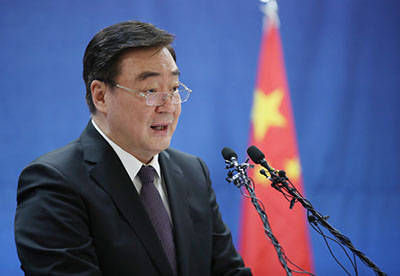by WorldTribune Staff, July 18, 2021
A Chinese official committed a “clear violation of sovereignty” by writing an article critical of a South Korean opposition presidential candidate’s policy platform, a conservative lawmaker in Seoul said.

In an opinion piece published by South Korea’s JoongAng Ilbo on Friday, Chinese Ambassador to South Korea Xing Haiming criticized 2022 South Korea presidential candidate Yoon Seok-Youl after Yoon had pledged that the U.S.-Korea alliance is the “solid foundation” on which to “strengthen cooperative relations with countries that share our values.”
Xing wrote that the U.S.-South Korea alliance “must not harm China’s interests” and that the alliance should not dictate China-South Korea ties.
Conservative South Korean lawmaker Park Jin said in a Facebook post that Ambassador Xing had “shown disrespect for diplomatic customs” after making “very regrettable” remarks about Yoon, Dong-A Ilbo reported. Park warned Xing against China engaging in “election interference.”
The South Korean presidential election is slated for March 2022. Leftist President Moon Jae-In is not eligible to run again as, under the South Korean constitution, the president is restricted to a single five-year term in office.
Related: Eerie parallels between U.S., South Korean elections foreshadowed in September 2020 webinar, February 15, 2021
Moon’s Democratic Party of Korea (DPK) in April suffered crushing defeats in mayoral elections in Seoul and Busan.
“The election sends a signal that the Moon government is mired in a lame-duck status,” said Hong Min, a senior researcher at the state-run Korea Institute for National Unification, according to a Korea Times report. “From North Korea’s standpoint, the attractiveness of the Moon administration as a talking partner has been further diminished because chances have become slimmer for Moon’s remaining appeasement policies being realized.”
Amb. Xing had also criticized Yoon’s defense of Seoul’s decision to deploy the U.S. missile defense system THAAD in 2016, a move that infuriated the communist leadership in Beijing.
“If [China] wants to insist on THAAD withdrawal, it must first withdraw its long-range radar deployed near its borders,” Yoon had said.
Xing claimed in his article that South Korea’s decision to deploy THAAD “seriously undermined China’s security interests” and the people of China have felt “less safe” since the decision.
Choi Kang, vice president of the Asan Institute for Policy Studies, said that Xing’s article “could be misinterpreted as being disrespectful while regarding Korea as an easy opponent,” the Chosun Ilbo reported on Friday.
It also is not common for an ambassador to comment on a host country’s domestic candidates. China’s central government could have “pressured” Xing to write the piece, Choi said.
INFORMATION WORLD WAR: How We Win . . . . Executive Intelligence Brief
